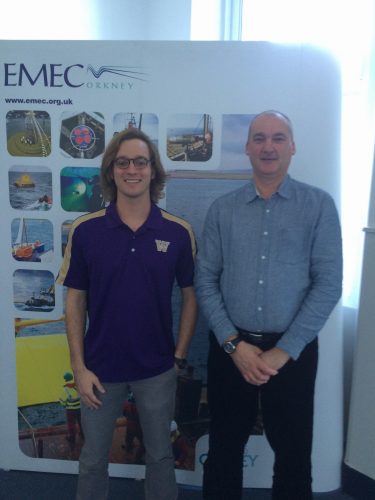Neal McMillin’s ambitions sit at the intersection of public policy, health, the environment and economics. For him, those interest areas converge at alternative energy. Specifically, in tidal energy and its potential to kick-start local economies, curb greenhouse gas emissions and contribute to healthier communities.
The University of Washington graduate student traveled the world exploring what it might take to get tidal energy projects off the ground and into the ocean.

“Tidal energy is where wind energy was 25 years ago. It’s still experimental; there are only a few scattered projects, and when you do work in the ocean it’s twice as complicated,” McMillin said. “But tides are predictable, more so than wind or sun, so we need to explore it.”
Before landing at the School of Marine and Environmental Affairs, McMillin lived near major environmental injustice and equity issues. In the Mississippi Delta, a public health crisis has been unfolding for decades. People there are underserved, underrepresented, and heavily affected by big industry and agriculture.
Although close by proximity, these issues were largely out of sight for McMillian growing up.
“I came from the best gig in Mississippi. I went to a great high school, have great parents, everything was available to me, but I was just a few miles from people who have it brutally rough.”
During his undergraduate years in the Southern Studies program at the University of Mississippi, the devastating impacts air pollution, unhealthy food options and chemical toxicity have on people started to crystalize in McMillin’s mind.
“We visited Cancer Alley in Louisiana, where smoke drifts from oil refineries into black communities,” he said. “You can smell it and taste it. That grounding, that realization will be with me forever.”
Field experiences, as well as face-to-face interactions and first-hand observations of a planet in flux, impacted McMillin’s trajectory and ultimately brought him to UW’s College of the Environment.
The way McMillin sees it, alternative energy could be key to addressing some of the public health and environmental issues he knows exist. It could also be a key piece of the energy independence nations seek, a way to increase jobs and support local communities.
“I came to the UW to work on the West Coast’s first tidal energy project led by the Snohomish County Public Utility District, which—after eight years of work—was cancelled right after I got to Seattle,” McMillin said. “What’d we learn from that? We need to make the process faster and better the next time around. I’ve been looking at ways we might be able to do that.”
In recent years, McMillin carved out three opportunities to visit Scotland, one of the world’s largest tidal energy producers. While there, he connected with regulators, academics, conservationists, fishing industry representatives and the owner of a local ferry company.
His goal? To better understand the opportunities and challenges associated with tidal energy projects, from economics and technology to policy issues and environmental impacts. McMillin brought what he learned back to Seattle, where conditions are ideal for exploring tidal energy as an alternative to hydroelectric dams.
For example, McMillin discovered that community members near project sites hold a wealth of relevant knowledge that goes largely untapped when companies and governments undertake new tidal energy projects.
Now McMillin plans to take his expertise to Capitol Hill, where he will advocate for robust exploration of tidal energy as a piece of the United States’ energy framework moving forward.
“For me, it’s all about trying to realize an area where you can make a strong impact, and really do your part,” McMillin said.

